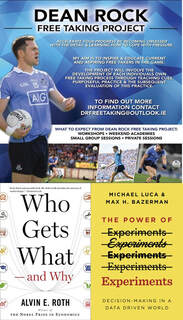
This was one of the stories discussed in yesterday’s Off-the-Ball Paper Review. Another discussion involved the loss of boxing talent (partly) due to financial constraints. The public funding of boxing was compared to the public funding of swimming. No prizes for guessing how boxing looked by comparison. And yet another newspaper story discussed involved Nike and the Clean Clothes Campaign.
Consider the presentation of the arguments by Nike and the Clean Clothes Campaign. The Clean Clothes Campaign, and those who support it, compare the payment received by the workers to the salaries of Premier League footballers and the price paid by customers for replica shirts. Nike compare the payments to their workers to those of similar workers. The comparisons are chosen to illustrate the arguments.
Dean Rock is a gaelic footballer. Like all gaelic footballers he is not paid to play gaelic football. However, he is paid by the Irish government to be available for selection to play for his county. Dean plays for Dublin – a county that has won the last five All-Ireland senior football titles. Dean is their player who takes more than his share of Dublin’s free kicks in the scoring zone.
Why the debate? It is useful to consider the reference points, or comparisons, used in the debate. Consider who Dean is compared to. The unpaid coaches from his childhood. The paid kicking coaches of other sports. The other county players who provide unpaid coaching. The other county players who take payment for coaching sessions. The paid strength & conditioning coaches. The unpaid strength & conditioning coaches. The unpaid club officials. The paid officials operating at county or Croke Park level. The paid games development officers.
A favourite comparison is with the money paid to the managers/coaches of GAA club teams. This ignores a more amusing comparison and what it says about the GAA. Many GAA clubs pay the “expenses” of a manager/coach from outside their club but they will not pay the “expenses” of somebody from inside the club. A few years ago, a club I know of, was coached by a member who had played with the club since childhood. He travelled over 200km per session to coach the team. No expenses. The club decided it needed an outside manager/coach in an effort to get promoted. That person’s services would require a financial outlay. No problem. The new coach would make the short journey was from a neighbouring parish. He was paid “expenses”. He did take them out of the division. Unfortunately, he took them down and not up. Relegation and not promotion. The old coach returned the following year. Promotion was secured. Expenses were not.
Whatever the club thought they were buying, it was not the quantity or quality of coaching. I see a similar situation annually in terms of academic coaching/teaching. Every year I hear about students who skip some of their lectures and tutorials that are provided by qualified, experienced and committed staff. Yet, they pay for private tuition in the same subject. The funny part is that they complain about the money being made by the private sector operator.
On the surface, it seems that the payment is for Dean Rock to impart his knowledge of free-taking. However, there is probably more to it. A parent might purchase the service for their child for the same reason that other parents buy the rights for their children to walk out at Anfield holding the hand of Jordan Henderson or one of his teammates. A wealthy aunt or uncle might decide it is an ideal present to show how much they care for, and think of, their nephew/niece. Or maybe a club might purchase Dean’s time to convey to their players that they are prepared to invest in the team’s development.
What I like about the Dean Rock service is that it says it will involve the "subsequent evaluation of this practice". Obviously, it will be far from a randomised control trial. Will it be based on a comparison of in-competition success rate? Will it involve a comparison of player A's conversion rates before and after the intervention? Or will it involve a comparison of free-takers coached by Rock versus those not coached by Rock? How will it control for other circumstances? I'd imagine that a few opponents might engage in verbals questioning the person's decision to get such coaching and reminding them of it after every unsuccessful kick.
To use the title of Alvin Roth's book, the Dean Rock service raises questions about payments in the GAA. Who gets what? And Why?
 RSS Feed
RSS Feed